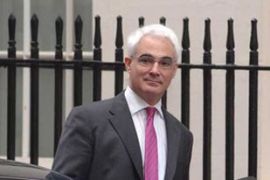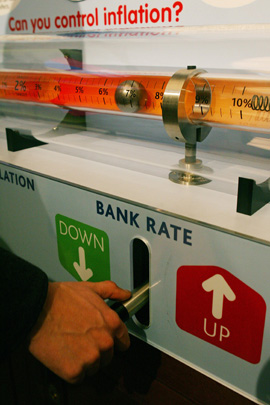Britain announces bank rescue plan
Government to buy up $87.5bn worth of shares in eight major banks amid liquidity crisis.

But the move has so far failed to encourage stock market investors. At 0759 GMT, London’s FTSE 100 index of leading shares was down on the previous day by 4.05 per cent.
The German DAX was down at 4.93 per cent, while the French CAC 40 was down by 4.82 per cent.
US lead
The British rescue package comes five days after the US House of Representatives passed a revised bailout scheme worth $700bn in an attempt to prop up ailing banks in the country, and as world stock markets continue to sink.
Gordon Brown, the British prime minister, said that the package was “designed to restore confidence and trust in the British banking system”.
“It will put the British banking system on a sounder footing and build strength for the future so that it can support jobs and prosperity right across our economy,” he said.
He also said that the government has proposed a Europe-wide funding plan to ease constraints in economies across the continent.
“We have invited other European countries to consider proposals we have put to them this morning on medium-term funding [and] are in active consultation about how we can adopt a European-wide funding plan,” he said.
Alistair Darling, the British finance minister, said that the plan would boost the short-term flow of money through the banking system and encourage lending between banks.
Darling said the plan by the country’s Labour government was a response to “extraordinary times” in the world economy, and denied that the British taxpayer is being taken for granted.
“The taxpayers’ interest is being protected. I’m very clear that in return for all this, the taxpayer has got to see some upside,” he told Sky News television.
HBOS, one of the worst-hit British banks amid the global economic crisis, welcomed the government rescue package.
“The government’s announcement represents a very real and serious intention on the part of the authorities, following consultation with the banking industry, to bring stability and certainty to the UK banking system,” a HBOS statement said after the plan was announced.
“HBOS believes that this initiative is very much in the interests of its shareholders and customers.”
Shares in HBOS rose by 27.7 per cent by 0715 GMT on Wednesday, a day after its share price dropped by 40 per cent.
Pragmatism
Alan Fisher, Al Jazeera’s correspondent at the London Stock Exchange, said on Wednesday that the problem stemmed from the banks’ decision not to lend to competitors amid fears that they could not recoup the money.
 |
| Interest rates could be cut in an attempt to stimulate the economy [AFP] |
“The government here is hoping that the plan will take the pressure off the banks and encourage them to start lending,” he said.
The British taxpayer would most likely consider the government plan to be a pragmatic move designed to shore up the country’s economy, Fisher said.
“Banks will not be able to hand out huge dividends to shareholders, or massive pay increases to their executives.
“The government here is saying that this could be good for the taxpayer in the long run,” he said.
“The government is buying shares in the banks while they are at a low level. If they buy the shares now and in three or four years they sell them when the banks are back to where they have traitionally been, that means a profit for those who hold shares – and that means a profit for the taxpayer.”
David Buik, from the brokerage firm BGC Partners, said investors remained dispirited in spite of the rescue plan and that central banks were still likely to opt for interest rate cuts.
“What I think investors are so dispirited about is that after the collapse of [US bank] Bear Stearns, the British government clearly did not have a contingency plan,” he said.
“The writing has been on the wall for the last 18 months about the damage that sub-prime lending (loans to people with a poor credit history) would do. I think it is a measure of criticism at the British government; over the past year it has been extremely ponderous.
“This [rescue package] situation has, frankly, been forced upon the government. If it had been pro-active a year ago and had better conversations with the major banks, perhaps proper mergers could have taken place and perhaps we would not be in this mess that we are in today.”